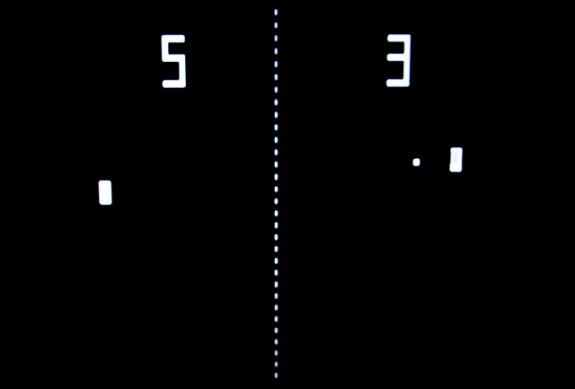Now You Can Control Video Games With Your Thoughts Alone
Thinking of blinking sends the paddle sailing in this brain-controlled version of PONG

Photo: Trevor Pritchard
Advances in video game controllers have taken us from joysticks to d-pads to dual analog to the ever-watching motion capture, but research by neurologists and computer engineers is inching us ever closer to the ultimate computer interface, one that harnesses our brain waves as the input to the game.
In the Raleigh News and Observer, Daniel Blustein introduces us to a team of scientists who rigged a game of PONG so that you could play it with your thoughts alone. Wearing a cap designed to measure brain activity players nod their head or blink their eyes, training the equipment to translate brain patterns associated with those motions into movement on-screen.
Katy McNamara, 15, of Chapel Hill began repeatedly nodding her head. As she moved, the electrode cap sent her brain activity to the computer. The signal from her brain was linked to the control for moving the paddle down. When she reproduced the action, the paddle would drop.
…During the game, Katy vigorously nodded her head and blinked her eyes to move her paddle down and up. The paddle movement was erratic at first, but with a bit of practice – and a lot of concentration – the paddle moved with ease.
Eventually, some of the students could just imagine their physical action and the paddle would respond onscreen.
That game, designed by Duke neuroscience PhD student David Schwarz is not the first of its kind. Computer engineers at Cornell last year performed a similar feat, again turning brain waves into PONG paddle motion.
Even outside of laboratory researchers’ side projects, mind-control video games are slowly becoming a thing. ‘Throw Trucks With Your Mind!‘, a game that lets you throw virtual trucks with your mind, got Kickstarter funding earlier this year. The upcoming Son of Nor is going for a similar trick. Then, in the realm of reality, the Puzzlebox Orbit is a real toy helicopter that you control with your brain.
More from Smithsonian.com:
Stories From the Vaults: Pong
Playing Video Games At Home Turns 40
/https://tf-cmsv2-smithsonianmag-media.s3.amazonaws.com/accounts/headshot/smartnews-colin-schultz-240.jpg)
/https://tf-cmsv2-smithsonianmag-media.s3.amazonaws.com/accounts/headshot/smartnews-colin-schultz-240.jpg)